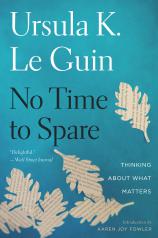No Time to Spare: Thinking About What Matters
Review
No Time to Spare: Thinking About What Matters
Readers inclined to think of Ursula K. Le Guin purely as a writer of science fiction and fantasy are in for a pleasant surprise when they pick up her new nonfiction collection, NO TIME TO SPARE. Possessing some of the same flinty spirit as Diana Athill's late-in-life writings, the 88-year-old Le Guin adopts a take-no-prisoners approach in brief essays traversing topics as diverse as literary criticism, contemporary politics and the antics of her cat.
Le Guin gathers more than 40 of the pieces from the blog she began in October 2010, inspired to explore this genre by Nobel Prize-winning Portuguese novelist José Saramago's THE NOTEBOOKS. Though at the outset she describes her efforts as "more trivially personal" than Saramago's, as Le Guin grows into the form it's easy to take issue with her modesty.
That's most clear in the section entitled "Trying to Make Sense of It," where Le Guin fearlessly wades into controversy, noting how the casualness of our soldiers’ public appearance reflects, or perhaps helps shape, American society’s “uncaring” attitude toward foreign wars (“We pay very little attention to our wars or the people fighting them.”). She’s a fierce critic of the “infection of capitalism” and specifically of the inadequacy of “growth” as an economic metaphor (“Capitalism thinks it’s adaptable, but if it only has one stratagem, endless growth, the limit of its adaptability is irrevocably set. And we have reached that limit. We are therefore at very high risk.”)
"Reading NO TIME TO SPARE feels like opening the window in a room full of stale air to usher in a fresh spring breeze."
But Le Guin saves her most scathing denunciation for our political leaders and what she sees as their penchant for lying. In an October 2012 post, she chides President Obama for his “false figures and false promises” in his first debate with Mitt Romney. After nearly one year of Donald Trump’s presidency, her concern about the “lower moral standard” we’ve come to accept in public life resonates even more powerfully than it did only a few years ago:
“That hard-minded man Saul Bellow wrote that democracy is propaganda. It gets harder to deny that when, for instance, during a campaign, not only aspirants to the presidency but the president himself hides or misrepresents known facts, lies deliberately and repeatedly. And only the opposition objects.”
“Can America go on living on spin and illusion, hot air and hogwash, and still be my country?” Le Guin asks. “I don’t know” was her answer in 2012, but it’s hard to imagine it would be any more positive today.
Le Guin holds equally definitive views about the world of literature (including a strong dislike for the work of Hemingway, Joyce and Roth). She offers a passionate brief for fantasy writing, pointing out that these works, to succeed, must be “stories in the adult, demanding sense,” with a grounding in a very real world, even if its rules of cause and effect, for example, are entirely invented. In that sense, Le Guin argues, imaginative literature poses a serious threat to the fundamentalist worldview. Despite garnering a shelf full of literary awards, including a National Book Award, she’s especially fond of the mythical Jean-Paul Sartre Prize for Prize Refusal, expressing the hope that “somebody really contemptible would award me a prize so I could be in the running” for it.
And Le Guin doesn’t flinch when she views the subject of aging from nearly the end of her ninth decade. Deriding the cliché that “Old age is not for sissies,” she observes that “Old age is for anybody who gets there.” Inspired by a questionnaire she received in conjunction with her 60th reunion at Harvard (she’s quick to point out that she’s a Radcliffe alumna), asking what she does with her “spare time,” she notes, “I still don’t know what spare time is because all my time is occupied. It always has been and it is now. It’s occupied by living.”
Interspersed among the serious pieces are more lighthearted ones about the tuxedo cat Le Guin acquired from the Humane Society in her hometown of Portland, Oregon, in 2011. Though “Pard” has a distinctive personality, especially when it comes to his techniques for handling mice, readers’ interest in these posts likely will turn on whether or not they’re cat fanciers.
Reading NO TIME TO SPARE feels like opening the window in a room full of stale air to usher in a fresh spring breeze. Now that she’s demonstrated her enthusiasm and facility for blogging, one can only hope for more of these lively pieces from Ursula Le Guin before the end of her distinguished literary career.
Reviewed by Harvey Freedenberg on December 15, 2017
No Time to Spare: Thinking About What Matters
- Publication Date: January 15, 2019
- Genres: Essays, Nonfiction
- Paperback: 240 pages
- Publisher: Mariner Books
- ISBN-10: 1328507971
- ISBN-13: 9781328507976




